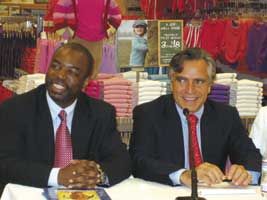|  Large-Scale
Efforts to Fight Illiteracy Large-Scale
Efforts to Fight Illiteracy
by
Rob Luchow
It
was almost a year ago that Reading Rainbow producer
and host LeVar Burton made a plea to corporate America. Without
enough funding, he said, the famous children’s public television
program would be cancelled. Eventually, one business chose
to help.
Recently,The
Children’s Place, a children’s clothing store with over 600
retail outlets nationwide, announced the start of ReadingUSA—a
national children’s literacy and community service campaign.
As its first action, CEO Ezra Dabah announced that it would
make a major contribution to Reading Rainbow by donating
a percentage of its sales to ensure that the show would continue
its invaluable programming. Yet for Burton, ReadingUSA’s action
is more than just funding. For him, it symbolizes a call to
arms for large corporations and organizations to recognize
that they must play an active role in helping America’s youth.
The fight against illiteracy takes a place on a large-scale
and that requires large-scale money and effort.
“I
applaud The Children’s Place for being the first company to
respond to help fund Reading Rainbow,” said Burton.
Although
this is ReadingUSA’s first initiative, according to Dabah, “it
is just the beginning.” “ReadingUSA is one way the company
can give back to the community and generate excitement about
reading and learning,” he said. He plans to expand the program
and center it around the concept of reading aloud.
Reading
is Fundamental (RIF), the nation’s largest nonprofit children’s
literacy organization, has been a continuous partner with Reading
Rainbow. Founded in 1966, their oldest and largest effort
is the National Book Program, an opportunity for children to
receive two to five free books they can keep for a year. In
addition, volunteers hold reading aloud sessions and encourage
community members to take an active role in increasing literacy
in their area.
Running
Start, another of RIFs programs, challenges teachers and parents
to encourage first graders to read 21 books in eight to ten
weeks. Other projects include a reading mentor program called
Club RIF and a family reading program called Family of Readers.
RIF’s
mantra is community. Its belief is that children learn to read
better when educators, parents and community members all play
a role in literacy advancement.
 RIF
needs funding to accomplish its goals. Corporate America has
become active in financing many projects for the organization.
The Coca-Cola Company, the organization’s largest donor with
a three-year $18 million grant, has been involved with several
projects. Included are StoryTravelers, a mobile and interactive
nationwide reading project that offers free books and activities,
Classroom Library Collections for 10,000 at-risk schools and
communities, and Ingenuity grants for researchers looking to
advance information on children’s literacy. RIF
needs funding to accomplish its goals. Corporate America has
become active in financing many projects for the organization.
The Coca-Cola Company, the organization’s largest donor with
a three-year $18 million grant, has been involved with several
projects. Included are StoryTravelers, a mobile and interactive
nationwide reading project that offers free books and activities,
Classroom Library Collections for 10,000 at-risk schools and
communities, and Ingenuity grants for researchers looking to
advance information on children’s literacy.
For
more information on national literacy campaigns, Literacy.org
serves as an excellent link to many literacy publications and
projects. The site’s major sponsor is the National Center on
Adult Literacy (NCAL). The group was established in 1990 with
a grant from the U.S. Department of Education. It receives
federal, state and local support as well as private funding
from corporations. The group’s goals are to increase effectiveness
in youth and adult basic education and literacy work, and to
expand access to information.
Since
the National Literacy Act of 1991, the federal government established
the National Institute for Literacy (NIFL) to improve the literacy
standards across the country. The group serves as a focal point
for public and private activities that support literacy development
on the national, state and regional levels. NIFL is the government’s
sole federal office focused on literacy and includes a ten-member
advisory board composed of prominent individuals from academic
and nonprofit institutions, private foundations, and the business
and labor sector. The group becomes directly involved in policymaking
by linking those in the literacy field with federal and state
lawmakers. NIFL also researches literacy in the country through
Partnership for Reading and makes information available for
the general public. Another focus is on improving services
for the learning disabled, promoting improvements in adult
literacy, and making all information regarding literacy advancements
easily accessible through hot lines and the Internet.#

Education
Update, Inc., P.O. Box 1588, New York, NY 10159.
Tel: (212) 477-5600. Fax: (212) 477-5893. Email: ednews1@aol.com.
All material is copyrighted and may not be printed without express consent of
the publisher. © 2003.
|
